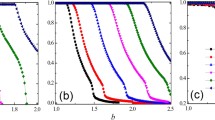Abstract
The regular small-world network, which contains the properties of small-world network and regular network, has recently received substantial attention and has been applied in researches on 2-person games. However, it is a common phenomenon that cooperation always appears as a group behavior. In order to investigate the mechanism of group cooperation, we propose an evolutionary multi-person game model on a regular small-world network based on public goods game theory. Then, to make a comparison of frequency of cooperation among different networks, we carry out simulations on three kinds of networks with the same configuration of average degree: the square lattice, regular small-world network and random regular network. The results of simulation show that the group cooperation will emerge among these three networks when the enhancement factor r exceeds a threshold. Furthermore, time required for full cooperation on regular small-world network is slightly longer than the other networks, which indicates that the compact interactions and random interactions will promote cooperation, while the longer-range links are the obstacles in the emergence of cooperation. In addition, the cooperation would be promoted further by enhancing the random interactions on regular small-world network.
Similar content being viewed by others
References
Hofbauer J, Sigmund K. Evolutionary Games and Population Dynamics[M]. Cambridge: Cambridge University Press, 1998.
Perc M, Gómez-Gardeñes J, Szolnoki A, et al. Evolutionary dynamics of group interactions on structured populations: a review[J]. Journal of the Royal Society Interface, 2013, 10(80):1–13.
Hauert C, De Monte S, Hofbauer J, et al. Volunteering as red queen mechanism for cooperation in public goods games[J]. Science, 2002, 296(5570): 1129–1132.
Brandt H, Hauert C, Sigmund K. Punishment and reputation in spatial public goods games[J]. Proceedings of the Royal Society of London B: Biological Sciences, 2003, 270(1519): 1099–1104.
Szolnoki A, Perc M. Reward and cooperation in the spatial public goods game[J]. EPL (Europhysics Letters), 2010, 92(3): 1–6.
Perc M. Sustainable institutionalized punishment requires elimination of second-order free-riders[J]. Scientific Reports, 2012, 2(344): 1–6.
Nikiforakis N. Punishment and counter-punishment in public good games: Can we really govern ourselves?[J]. Journal of Public Economics, 2008, 92(1): 91–112.
Nowak M A, May R M. Evolutionary games and spatial chaos[J]. Nature, 1992, 359(6398): 826–829.
Nowak M A. Evolving cooperation[J]. Journal of Theoretical Biology, 2012, 299(4): 1–8.
Szabó G, Vukov J. Cooperation for volunteering and partially random partnerships[J]. Physical Review E, 2004, 69(3): 1–7.
Zhou Z Y, Mao B H, Hao H M, et al. Regular small-world network[J]. Chinese Physics Letters, 2009, 26(11): 1–3.
Guan J Y, Wu Z X, Huang Z G, et al. Prisoner’s dilemma game with nonlinear attractive effect on regular small-world network[J]. Chinese Physics Letters, 2006, 23(10): 2874–2877.
Wu Z X, Xu Z X, Wang X J. Prisoner’s dilemma game with heterogeneous influential effect on regular small-world networks[ J]. Chinese Physics Letters, 2006, 23(3): 531–534.
Vukov J, Szabó G, Szolnoki A. Evolutionary prisoner’s dilemma game on Newman-Watts networks[J]. Physical Review E, 2008, 77(2): 1–5.
Barabási A L, Albert R. Emergence of scaling in random networks[J]. Science, 1999, 286(5439): 509–512.
Fan R G, Zhang Y Q, Luo M, et al. Promotion of cooperation induced by heterogeneity of both investment and payoff allocation in spatial public goods game[J]. Physica A: Statistical Mechanics and Its Applications, 2017, 465(1): 454–463.
Santos F C, Santos M D, Pacheco J M. Social diversity promotes the emergence of cooperation in public goods games[J]. Nature, 2008, 454(7201): 213–216.
Perc M. High-performance parallel computing in the classroom using the public goods game as an example[J]. European Journal of Physics, 2017, 38(4): 045801.
Szolnoki A, Perc M, Szabó G. Topology-independent impact of noise on cooperation in spatial public goods games[J]. Physical Review E, 2009, 80(5): 1–5.
Szabó G, Hauert C. Phase transitions and volunteering in spatial public goods games[J]. Physical Review Letters, 2002, 89(11): 1–4.
Axelrod R, Ford G R, Riolo R L, et al. Beyond geography: Cooperation with persistent links in the absence of clustered neighborhoods[J]. Personality and Social Psychology Review, 2002, 6(4): 341–346.
Sicardi E A, Fort H, Vainstein M H, et al. Random mobility and spatial structure often enhance cooperation[J]. Journal of Theoretical Biology, 2009, 256(2): 240–246.
Wu B, Zhou D, Fu F, et al. Evolution of cooperation on stochastic dynamical networks[J]. PloS One, 2010, 5(6): 1–7.
Author information
Authors and Affiliations
Corresponding author
Additional information
Foundation item: Supported by the National Natural Science Foundation of China (71601148), the National Social Science Foundation of China ( 14ZDA062) and Humanities and Social Science Research Foundation of Ministry of Education (14JDGC012)
Rights and permissions
About this article
Cite this article
Zhang, Y., Fan, R. & Luo, M. Emergence of group cooperation in public goods game on regular small-world network. Wuhan Univ. J. Nat. Sci. 22, 529–534 (2017). https://doi.org/10.1007/s11859-017-1284-8
Received:
Published:
Issue Date:
DOI: https://doi.org/10.1007/s11859-017-1284-8




